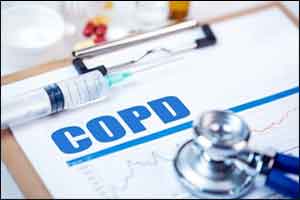- Home
- Editorial
- News
- Practice Guidelines
- Anesthesiology Guidelines
- Cancer Guidelines
- Cardiac Sciences Guidelines
- Critical Care Guidelines
- Dentistry Guidelines
- Dermatology Guidelines
- Diabetes and Endo Guidelines
- Diagnostics Guidelines
- ENT Guidelines
- Featured Practice Guidelines
- Gastroenterology Guidelines
- Geriatrics Guidelines
- Medicine Guidelines
- Nephrology Guidelines
- Neurosciences Guidelines
- Obs and Gynae Guidelines
- Ophthalmology Guidelines
- Orthopaedics Guidelines
- Paediatrics Guidelines
- Psychiatry Guidelines
- Pulmonology Guidelines
- Radiology Guidelines
- Surgery Guidelines
- Urology Guidelines
Revefenacin may be first once-daily, long-acting treatment for COPD

Positive results from Phase 3 clinical program for YUPELRI™(revefenacin) inhalation showed reductions in the rates of chronic obstructive pulmonary disease (COPD) exacerbations ranging from 15% to 18% in moderate to very severe COPD patients administered once-daily YUPELRI for up to 52 weeks as compared to placebo and tiotropium (Spiriva® HandiHaler®),announced Theravance Biopharma and Mylan at the European Respiratory Society (ERS) International Congress 2018.
Yupelri (revefenacin) inhalation solution, an investigational long-acting muscarinic antagonist (LAMA) is currently under review for the treatment of moderate to very severe chronic obstructive pulmonary disease.
Researchers evaluated and presented data on chronic obstructive pulmonary disease exacerbations that were collected from the three clinical trials comprising the Phase 3 YUPELRI program. Pooled data from the two replicate 12-week pivotal Phase 3 efficacy trials, which included a total of 1,229 patients with moderate to very severe COPD, demonstrated that the mean annualized rate of all chronic obstructive pulmonary disease exacerbations was 0.47 for YUPELRI dosed at 175 mcg/day and 0.45 for YUPELRI dosed at 88 mcg/day. When compared to the mean annualized rate of exacerbations for placebo of 0.55, these results represent COPD exacerbation rate reductions in the range of 15% to 18%.
Additionally, data from the 12-month Phase 3 safety trial, which included a total of 1,055 with moderate to very severe chronic obstructive pulmonary disease , demonstrated that the estimated annualized rate of all chronic obstructive pulmonary disease exacerbations was 0.38 for YUPELRI dosed at 175 mcg/day and 0.57 for YUPELRI dosed at 88 mcg/day, compared to 0.46 for tiotropium (Spiriva® HandiHaler®) dosed at 18 mcg/day. These results for the 175 mcg/day YUPELRI does represent a 17% reduction in COPD exacerbation rates as compared to tiotropium.
Read Also: Targeted lung denervation new safe treatment for COPD
“While this post-hoc analysis was not powered for statistical significance, it did demonstrate an interesting trend highlighted by a reduction in COPD exacerbation rates of more than 15% with the 175 mcg/day YUPELRI dose as compared to both tiotropium and placebo," said James F. Donohue, lead author for the data presented at ERS.
If approved, reverencing would be the first once-daily, long-acting nebulized bronchodilator for the treatment of chronic obstructive pulmonary disease.

Disclaimer: This site is primarily intended for healthcare professionals. Any content/information on this website does not replace the advice of medical and/or health professionals and should not be construed as medical/diagnostic advice/endorsement or prescription. Use of this site is subject to our terms of use, privacy policy, advertisement policy. © 2020 Minerva Medical Treatment Pvt Ltd